Slacking Towards Babylon: 25th anniversary edition
Fastball led "The Way" to major label deals for Spoon and David Garza
Austin returned to being a cheap college town in the mid-to-late ‘80s, after a few years of overdevelopment and overextention came to an end when the oil biz tanked, and the real estate boom went bust. Landlords were voluntarily lowering rents, so bands living together in big, old houses could get by on just one part-time job. It was a good time to be poor, this last glimmer of Austin Bohemia.
That changed in the ‘90s, when folks started moving to Austin for jobs, not gigs. Complaints by downtown condo-dwellers reclassified music as noise at the property line, but three Austin acts, signed to major labels, were on the verge of taking their sounds much further. You’re not supposed to care about mainstream success in Austin, but that’s a myth perpetuated by musicians who tried and failed.
Discounting Christopher Cross as a San Antonio native who moved to Los Angeles before the monster debut LP, Austin had its biggest year on the pop charts in 1986, when the Fabulous Thunderbirds (“Tuff Enuff”), Charlie Sexton (“Beat’s So Lonely”) and Timbuk3 (“The Future’s So Bright I Gotta Wear Shades”) all had Top 20 Billboard hits. Then there was a 10-year drought until “Pepper,” Butthole Surfers do Beck, hit #1 on the Billboard modern rock chart in 1996.
Aside from a few break-throughs, our recordings have historically accepted Austin as a final destination, but with such fresh tracks as “Metal Detektor” by Spoon, “Discoball World” and “Float Away” by David Garza, “The Way,” and “Out of My Head” by Fastball, “Bitch” by Sincola, “Idea” by Sixteen Deluxe, and “Four Leaf Clover” by Abra Moore, Austin acts in the ‘90s were creating music with a universal appeal. The studio was becoming more important than the stage.
FASTBALL Seeks the heat
A long Tuesday in April 1998 began for Fastball with a 9 a.m. live acoustic appearance on some stupid radio station on Long Island. In the afternoon were phone interviews seemingly on the half-hour, as writers from Alaska to Florida wanted to know what the band’s hit single “The Way” is about. “It could be about anything,” said guitarist Miles Zuniga, of the utterly catchy song written and sang by bassist Tony Scalzo. “To me, that lyric about `Where were they going without ever knowing the way?’ is about being in a band,” Zuniga told the critic from the New York Daily News. “With most jobs you can plan your trajectory, but in a band, you either go over or you don’t.” That he said this from the green room of the Late Night With Conan O’Brien‘ show underlined that Fastball was going over well indeed. “The Way” had been the #1 song on the Billboard modern rock radio chart for more than a month, giving the Disney-owned Hollywood Records its first bona fide hit. The album All the Pain Money Can Buy moved more than 20,000 units a week, which was 10 times more than the total sales of the band’s first Hollywood LP Make Your Mama Proud.
“I’ve never had things go right before,” Zuniga, 32, said to the oft-asked question about how the band is reacting to the sudden success. “The last album was selling about 40 copies a week, and I remember one week it sold 65 and we were all going, `It’s starting to explode!’ ”
DAVID GARZA: Born in the shadow, raised by the light
David Garza, whose ‘98 Atlantic release This Euphoria completed a remarkable “Boy II Man” transformation, was another Austin artist who was starting to make some moves nationally. Signed after a sensational 1996 SXSW set at Steamboat, Garza got the creative control he wanted and left marketing to the label. Atlantic saw the 27-year-old Dallas native as someone with a great Ani DiFranco-like story of finding success on his own terms, and so they pushed him onto a tour as DiFranco’s opening act. But Garza hated the gig. “I miss my band,” he said by phone from a Cincinnati hotel room. “To me that’s what it’s all about: getting up there with your electric guitars wailing while people go nuts. Meanwhile, here I am, night after night, playing an acoustic guitar for a group of people that can’t wait to see Ani DiFranco.”
Garza longed for the nights like three months earlier, when he and his band played for 7,000 fans in Detroit, opening for multiplatinum labelmates Matchbox 20. The set kicked off, as does This Euphoria, with “Kinder” and its aggressive guitar rhythm. “It was all so perfect that when I stepped up to the mic to sing I just became overwhelmed by the moment of rock,” Garza recalled. “My knees gave out and I was on the floor. I’ve never known anything as powerful as that moment, my first time playing in an arena. I couldn’t sleep that night.”
When he sang "I was born in the shadow of a stadium" on "God's Hand," Garza was talking about Texas Stadium, former home of his beloved Dallas Cowboys and a couple of Texxas Jam concerts of yore that rocked his core. Garza's parents, who met as teen-agers in the Rio Grande Valley and went to UT together, moved to Irving in '67, just after David's dad returned from Vietnam. Mr. Garza got a good job as a management consultant with the federal government and spent much of that salary sending his four kids (David's got two older brothers and a younger sister) to Catholic school. "When I was in high school I begged my parents to send me to the Arts Magnet school (which would prep such talents as Erykah Badu, Norah Jones, Roy Hargrove, Edie Brickell and Earl Harvin), but they wouldn't hear of it," said David, who was becoming a jazz prodigy in junior high.
Music theory finally overtook catechism in his life in 1989 when he received a scholarship to study classical guitar at UT. There he started jamming on the West Mall with fellow music students Chris Searles, who played bongos or drummed on a guitar case, and standup bassist Jeff Haley. Twang Twang Shock-a-Boom became an almost-instant sensation, selling a thousand or so cassettes of Me So Twangy and packing the clubs. Everybody loved them- except veteran Austin musicians, who couldn’t see what the kids did. Songs about fishsticks?!
Garza left the trio after just a year, and made it seem like they were holding him back, releasing nine self-produced albums from ’91-’97. But “Dah-veed,” which he named his band so folks would stop anglicizing his name, could never draw as well as Twang Twang. Fans tend to love the band better, which is why Don Henley plays arenas and the Eagles play stadiums.
Euphoria was a well-received miss, but a miss nonetheless, so Atlantic got more involved in the followup Overdub. You know the refrain: “We don’t hear a single.” When Atlantic delayed Overdub until Garza could produce some radio candy, he sent back a cynical number about making concessions. "Soul is a four-letter scam," he sang in his lanky falsetto. "The DJ won't spin your jam until you say baby, baby, baby, baby, baby." Atlantic released it as a single and it sank.
"(David) doesn't need all that pushing and marketing,” said Craig Ross, whose association with Garza goes back to his production on an early Twang Twang cassette. "If it all fell apart tomorrow, if the major label deal went away and he had to start all over, David would be fine."
It did and he was.
SPOON: Fans make the best music
Where Garza was born to be a fully independent troubadour, Britt Daniel and Spoon had the hook-heavy sound made for the majors. Bidding war, blah blah blah, they chose Elektra, whose V.P. of A&R was their biggest fan. The home of the Doors posed a let-the-music-do-the-talking approach to the band’s major label debut in 1998. But that ended up being their way of justifying doing absolutely nothing. The record release celebration for A Series of Sneaks was a pizza party in the Manhattan offices of Elektra.
The Austin trio released a previous LP and EP on NYC’s hip Matador Records, but nobody liked them because they sounded too commercial, like the Pixies wanting to be the Cars. But Britt Daniel was growing as a songwriter, and Jim Eno as a percussionist. Spoon clicked like never before when they recorded Sneaks in producer John Croslin’s garage, on their own dime. When cassettes circulated, the suits circled.
But after they signed, their label guy Ron Lafitte stopped returning their calls. Just four months after the release of the album, both Lafitte and the band were off the label. Ten months later, Sneaks was out of print. And you think you have a record company horror story?
Britt Daniel was so repulsed by the Elektra experience, he penned two songs of melodic vitriol about their personal Uri Geller- “The Agony of Laffitte” and “Laffitte Don’t Fail Me Now”- released on Saddle Creek. But Merge became the right home in 2001, with Spoon emerging as a great band of the new millennium with Girls Can Tell and the modern rock radio hit “The Way We Get By.” A year later came the near-perfect Kill the Moonlight, also co-produced with Mike McCarthy, who was becoming their George Martin, or at least their Butch Vig.
Series of Sneaks didn’t die. It was resuscitated by Merge in 2002, and is today considered Spoon’s first great LP, landing at #54 in Pitchfork’s best album of the ‘90s. Tellingly, the album ended with “Advance Cassette,” a song of love lost- to a tape! When I met with a 27-year-old Daniel at the Dog and Duck Pub on the release of Sneaks in April ‘98, we talked more about the music that made him get by in the drabness of Temple, Texas than what he’d just put his name to.
I had a theme: fans make the best music because they understand what great songs can do. They want to make listeners feel the way their favorite songs made them feel. That’s what Britt Daniel has going on.
When he went off to college it was to the “cool town” of Austin, where he got an RTF degree (the slacker diploma) from the University of Texas and a Band 101 education with such groups as Skellington (named after a Julian Cope album), the Alien Beats (where he met Eno, a moonlighting techie) and, soon after graduating in 1993, Spoon, which was named after a song by Can.
Breaking the Austin cycle
Spoon and Fastball were part of the cool new scene happening at the Hole In the Wall in the mid-‘90s, with such bands as El Flaco, Enduro, Silver Scooter, Glorium, Big Drag, Kiss-Offs, Starfish and Teen Titans realizing that the way to stand out is to not sound like the others. Every Sunday night was a scene, but aside from a few 7” releases on Travis Higdon’s Peek-a-Boo label, Paul Minor’s “Free for All” at the Hole was a launching pad to the bored beyond.
The few gold record acts from Austin in the ‘90s- Dangerous Toys, Eric Johnson, the Vaughan Brothers, Shawn Colvin- were vastly outnumbered by the list of acts who’ve turned Austin into a money pit for major labels: Wagoneers, Prescott Curlywolf, Poi Dog Pondering, LeRoi Brothers, James McMurtry, Lou Ann Barton, Kacy Crowley, Year Zero, Jimmie Dale Gilmore, Kelly Willis, Bill Carter and the Blame, Will and the Kill, Will T. Massey, Omar and the Howlers, True Believers, Damnations, Pushmonkey, Storyville, Ugly Americans, Big Car, and even Joe Ely lost money for their labels.
Too often, Austin acts went into the studio in an attempt to capture a live set that drove crowds to frenzy, but the best newer bands created something more than a calling card for bookers.
“You go through so much rejection in this business that you become a ball of self-doubt,” Tony Scalzo said the day after Conan in his Times Square hotel room. He had MTV on and ate green chowder from one of the many gourmet soup kitchens that have sprung up in NYC since Seinfeld.
As if on cue, the video for “The Way” came on MTV and Scalzo straightened up. “Whenever I hear them mention Fastball on MTV, it’s as if sparks are flying from their voices,” Scalzo said. Don’t be fooled by his constant pining to be back in Austin, with his pregnant wife Nanette: Scalzo was digging every minute of his band’s success. But he did think that the expense account was getting out of hand. “The wine was flowing at dinner last night,” he said. “At $130 a bottle, I might have to start drinking again, as long as I’m paying for it.”
The son of a career Marine, Scalzo moved around a lot as a kid before the family settled in Orange County, CA. It was a promise of a job as a working musician that moved Scalzo, his then-girlfriend, and daughter Scarlett to Austin in 1992. Light Storm Records, owned by Titanic director James Cameron, had signed a soulful scruff named Beaver Nelson, and bassist Scalzo and drummer Jamie Riedling had been lured from California to be the rhythm section. When Riedling moved back to L.A., due to Austin’s lack of surfing, ex-Wild Seeds drummer Shuffield was brought aboard. Guitarist Paul Minor rounded out the backing band. “I was promised $1,000 to move to Austin, but, of course, when I got here there was no money,” Scalzo recalled. “Paul and Beaver were out of town, so there was no place to stay for a couple days. Here I was, virtually broke and homeless, with a baby to take care of — Welcome to Austin!”
Scalzo and Shuffield were let go after recording the Beaver Nelson album that was never released. Seeing this crack rhythm section suddenly available, Zuniga rebounded from the demise of Big Car (which included Shuffield on drums) and started a rockin’ pop trio, which he called Magneto. When it was discovered that there was a popular band in Mexico called Magneto, the Austin trio added USA to its name. Signing to Hollywood called for an entirely new name, but their first choice was rejected after Spoon’s Daniel told them from the stage of the Hole in the Wall: “I like you guys too much to allow you to call yourselves ‘Starchy’.”
This one’s for the Howards
“The Way” wasn’t conceived as a tragic song, said Scalzo. “It was written before they found the bodies.”
Dead were Lela and Raymond Howard, an elderly Salado couple who went out for a cup of coffee and ended up driving all the way to Arkansas. “I read the first story in the Statesman, that they’d disappeared, and the first thing that hit me was that this older couple could have just decided to chuck the straight life and headed out on an adventure. I got caught up in the romantic notion.” Instead, the couple in their ‘80s suffered from dementia.
The Howards were found two weeks later in their car, which had tumbled over a 25-foot cliff neat Hot Springs, Arkansas. Asked what he tells interviewers who press on the fate of the couple, Scalzo said, “Sometimes I tell them that they were found, that everything was cool. Everybody loves a happy ending.”
But there weren’t many to be found in Austin in the ‘90s, a decade that started with the tragedies of Stevie Ray Vaughan and four girls in a yogurt shop, and ended with the death of Doug Sahm and the closings of Liberty Lunch, Steamboat, Electric Lounge and Austin Rehearsal Complex, all in ‘99. To show how the century ended for the local music scene, the Austin Chronicle canceled its musicians appreciation dinner in 1999.
Austin became a real city in the ‘90s, and a lot of that charming smalltown shit was taking up valuable real estate and had to go. We were like the plain, mousey girl in school with glasses and stringy hair who comes back beautiful after the summer. Suddenly, everybody wanted us, and we couldn’t leave the house without being hit on. The attention is flattering, but sometimes you just want to read your book and drink your coffee in peace.
This epilogue is as positive as you can imagine. Spoon has continued to make great albums, as Britt Daniel seems obsessed to top the previous record. Fastball has also stayed active, writing and recording new songs, even as they tour the world on the ‘90s nostalgia circuit. And the ever-creative David Garza not only co-produced and played several instruments on Fiona Apple’s Grammy-winning Fetch the Bolt Cutters (2020), he designed the album cover!
Next up: Garza produced the upcoming, self-titled Fastball LP. And Britt Daniel and Miles Zuniga have been seen around town, in a collaborative mood.
MORE READING
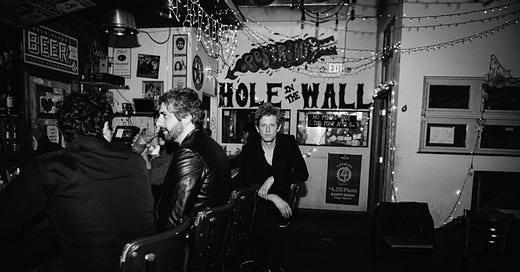



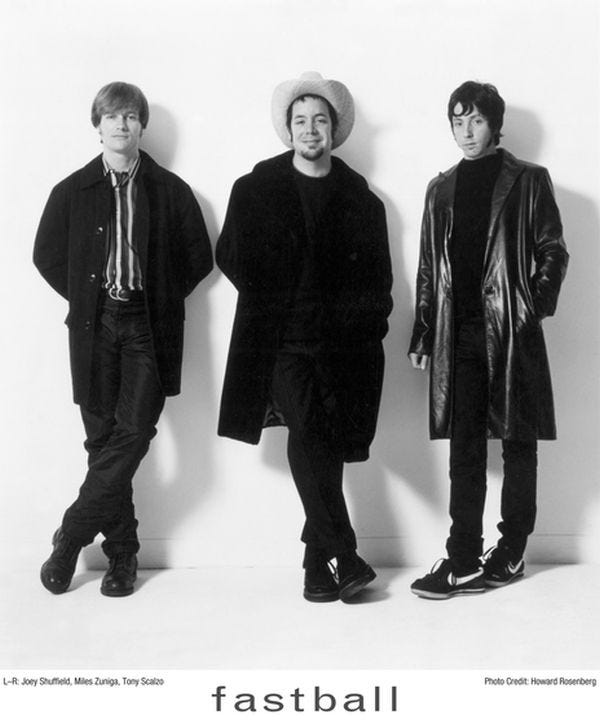


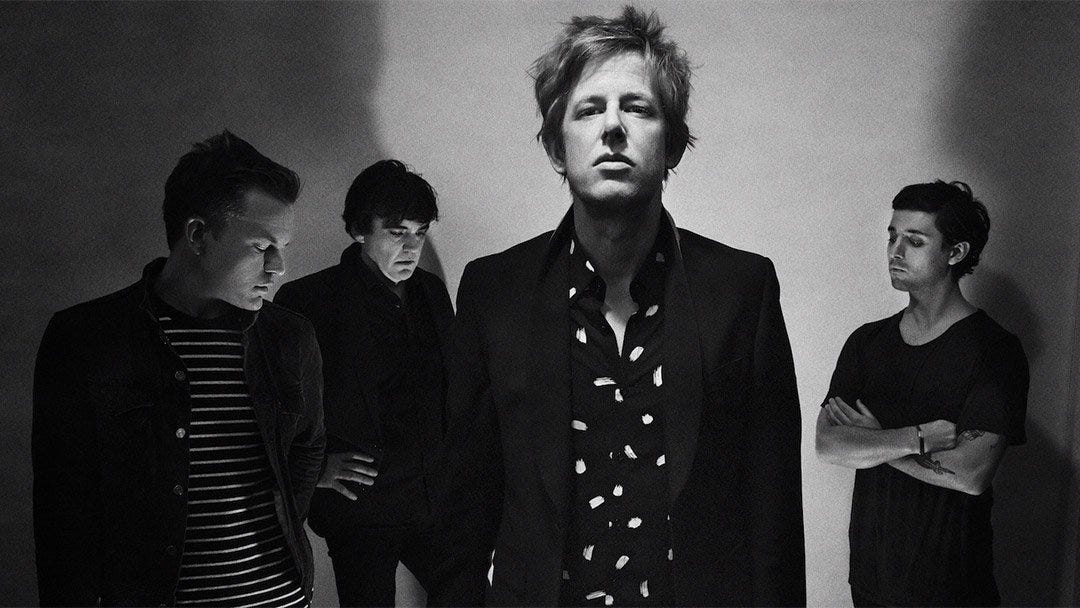
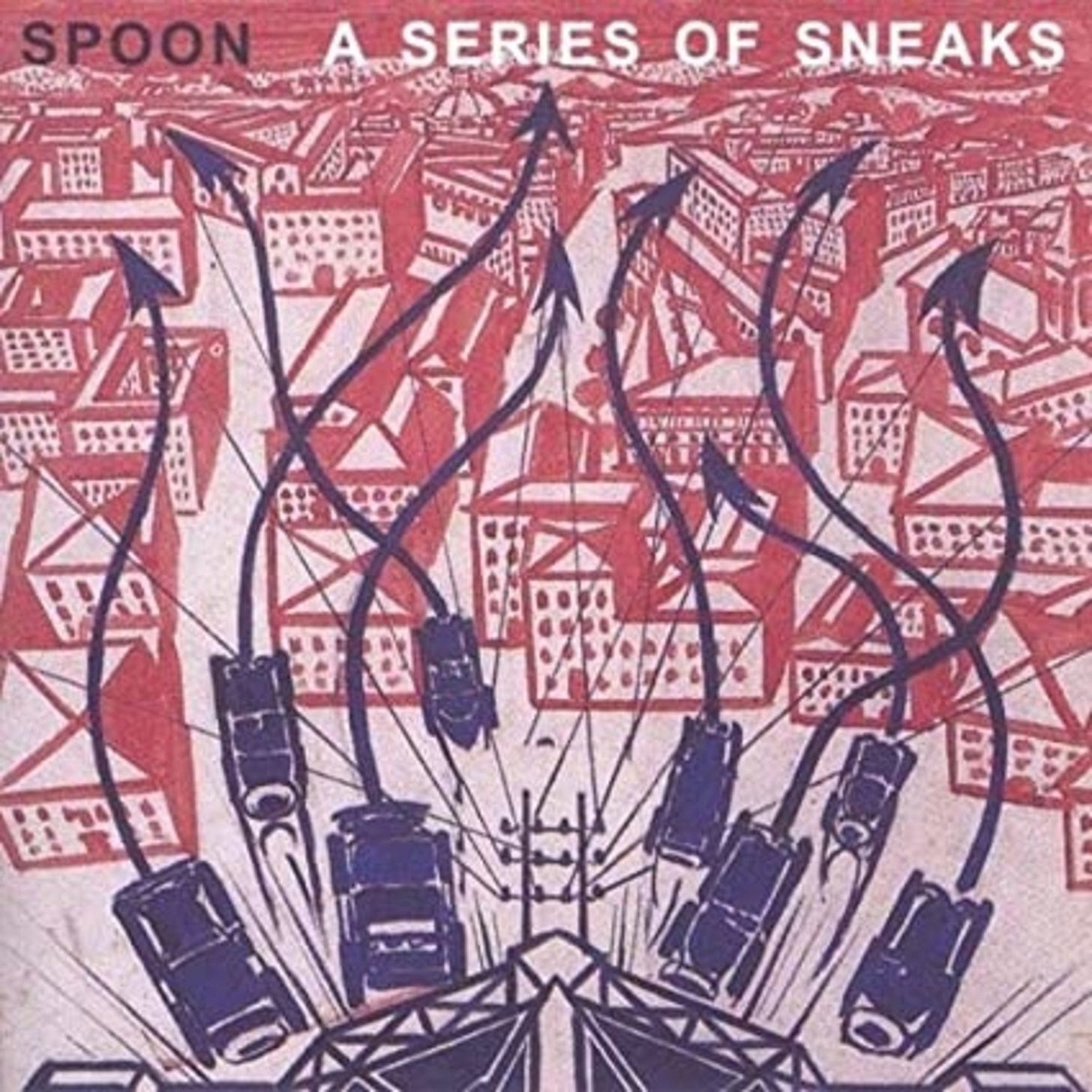
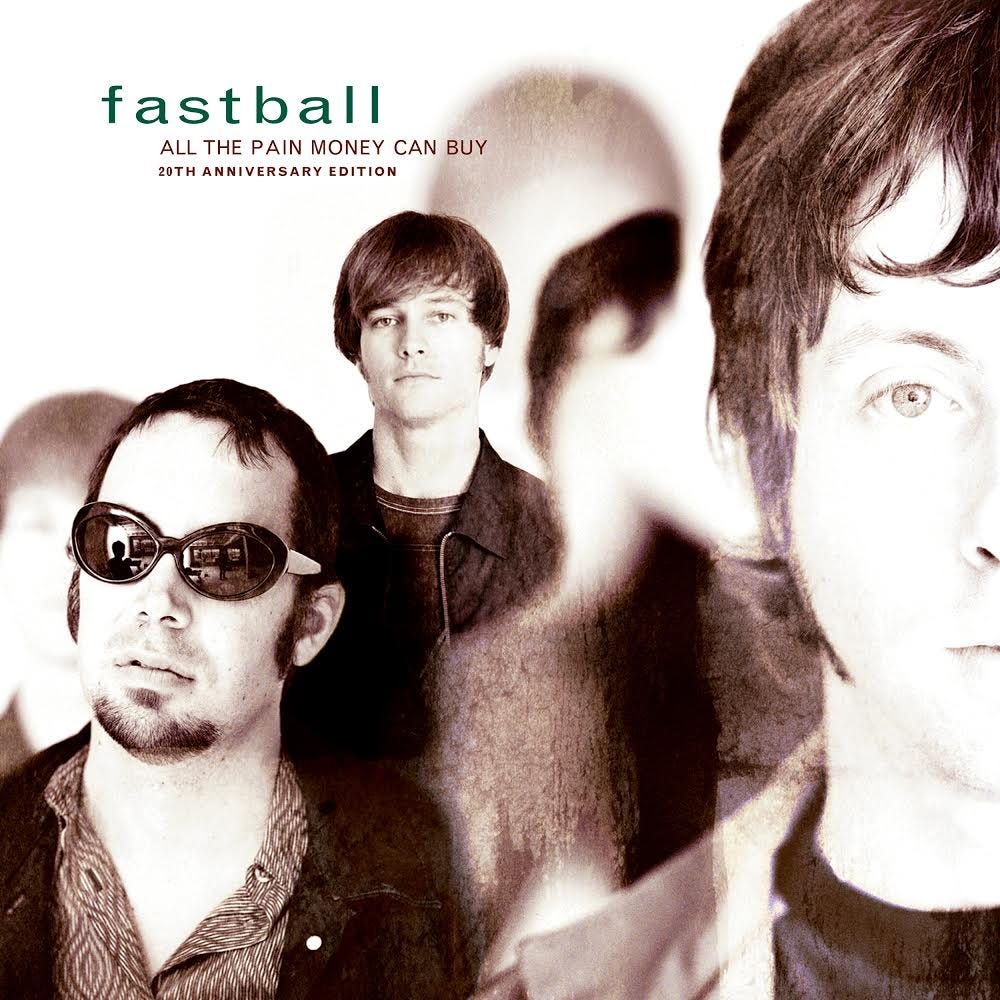

Yeah, SRV&DT had gold & platinum records in the 80’s and the Arc Angels record was gold in the early 90’s It looks like a different kind of history article.
Didion's impressions of the 1960s Haight-Ashbury found in "Slouching Toward Bethlehem" was not lost on me. Didion borrowed from Yeats' "Second Coming."
(ending: ""And what rough beast, its hour come round at last,
Slouches towards Bethlehem to be born?"")
Your choice of "Babylon" -brings to mind the Melodians (& then Jimmy Cliff's) rendition of Psalm 137.
"By the Rivers of Babylon ...
..and there we wept, when we remembered Zion
... How can we sing King Alpha's song in a strange land."
These kids are busy being born:
https://www.youtube.com/watch?v=mYJS7AOrnbI
(Barton Hills Elementary sing Fastball)
Dylan's lyric ("It's Alright Ma, I'm Only Bleeding")
"... he not busy being born is busy dying..."
gives us all somewhere to slack and slouch toward.
Daniel Dodson - 4th Generation Austin -30-